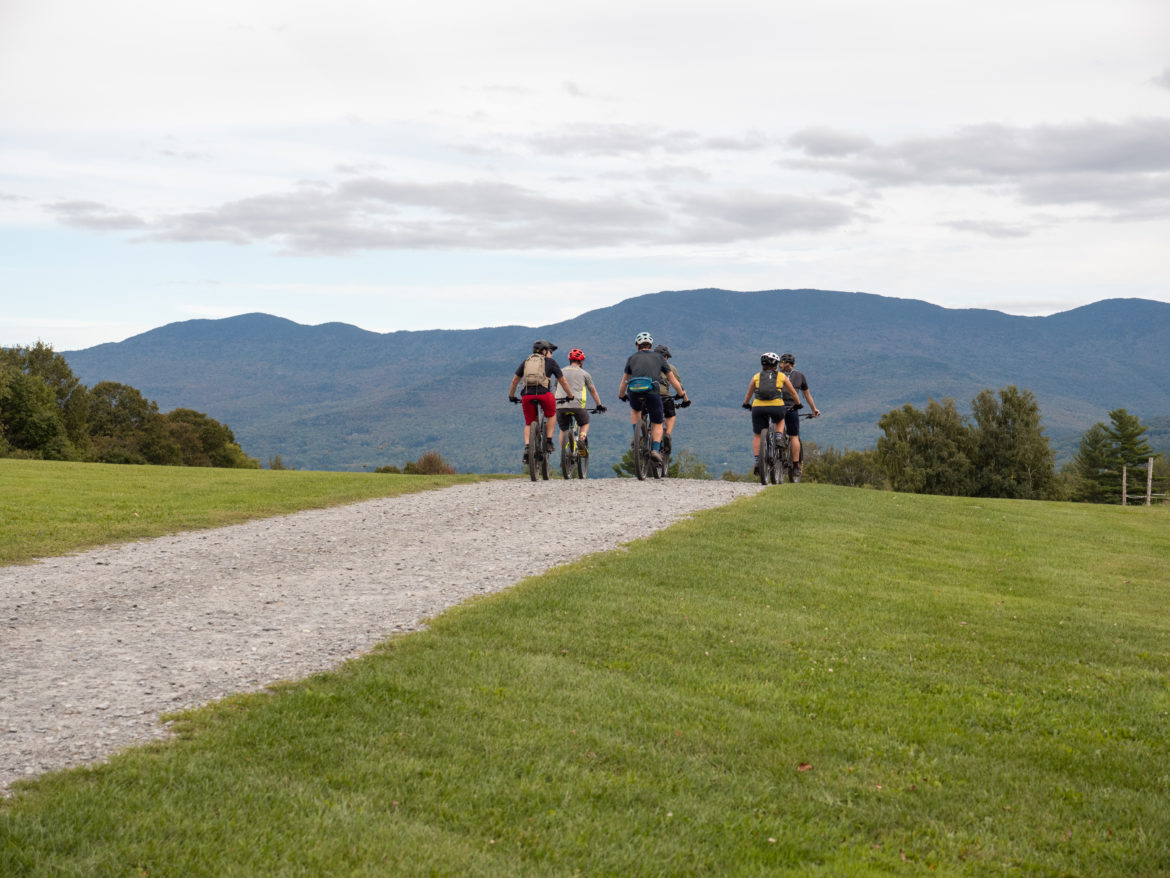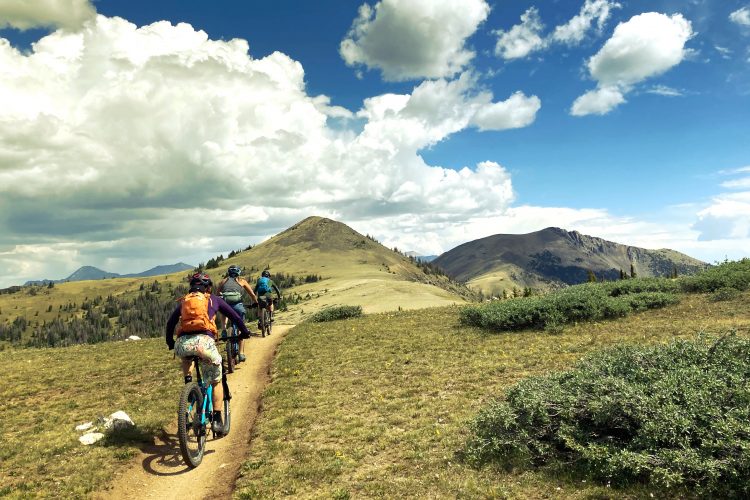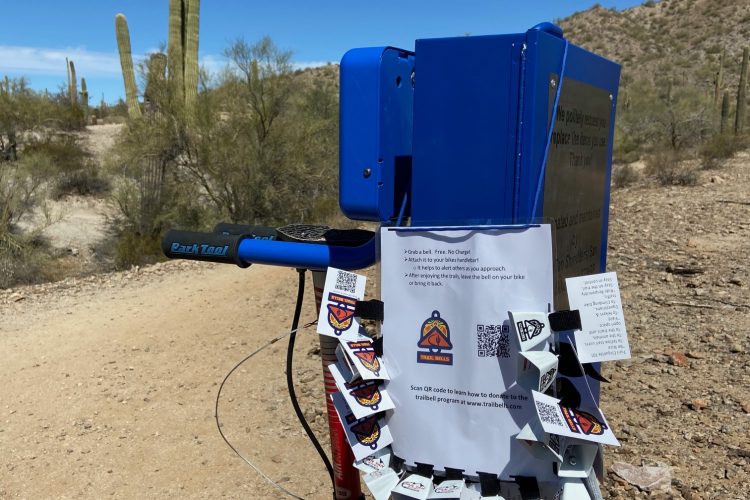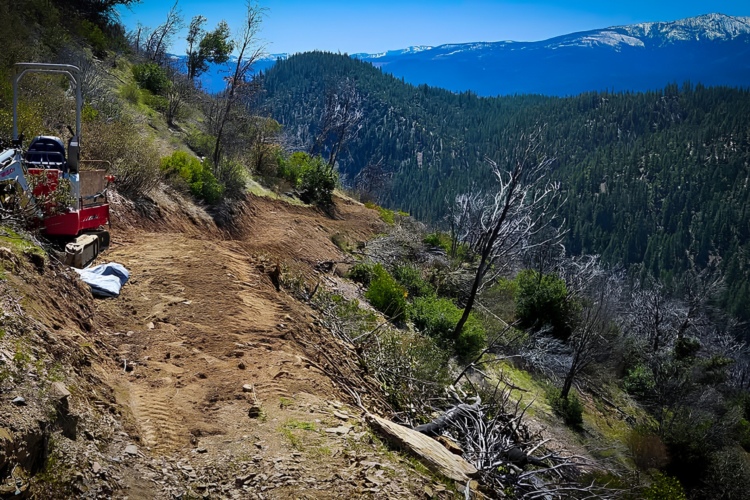
Conflict between trail user groups and land owners looks different state to state, region to region. Some mountain bike groups have friction between hikers and equestrians, some between state land management agencies, and some between private land owners. Often, unfortunate as it is, it’s up to mountain bikers to prove why they deserve a seat at the table and a spot on the trail.
The loss of mountain bike access to several key trails at Vermont’s Kingdom Trails in 2019 was devastating to the organization and to the mountain bike community. Reeling from the loss, The Kingdom Trails wanted to do something to improve etiquette, to reduce tension, and to show land owners that mountain bikers cared about what happened. Rather than a message coming solely from Kingdom Trails though, they sought help from a regional mountain bike group, Bike the Borderlands. The group is now made up of nine individual mountain bike organizations under the Northern Forest Center. Under Bike the Borderlands sits a new initiative: Ride With Gratitude.
Five or so years ago, the Northern Forest Center thought about how they could incorporate more mountain biking across the changing forest economy in the Northeast. Historically, the Northern Forest, 30 million acres of trees across northern Maine, New Hampshire, Vermont, and New York has contributed to a timber and paper-making economy. But as the region’s economy and population has shifted, it’s sparked interest in tourism- and recreation-based economies.
Bike the Borderlands was a product of looking at the next phases of the region’s economy. The organization started with five or six mountain bike organizations and now has nine, including two groups in New Hampshire, two in Vermont, two in Maine, one in Quebec, and likely more on the way.
When Kingdom Trails got in touch with Bike the Borderlands, Borderlands came up with the Ride With Gratitude campaign. Maura Adams, the Director of Community Investment for Northern Forest Center explained the campaign helps change underlying stigma some may have regarding mountain bikers.
“There are always going to be people who are disrespectful either to landowners or misuse land or whatever it might be,” she said. “But let’s make a concerted effort to show that we are by and large people who love the lands, love the trails, want to be responsible, and want to respect private land, and show gratefulness to these landowners who have no incentive to let us ride bikes on their land.”
Mountain biking in the Northeast largely takes place on private land like the Kingdom Trails. The four tenets of Ride With Gratitude remind users that mountain bikers should respect and be grateful for the land we get to ride on.
“Riding trails on public or private lands is a gift, not a right. That hiker we just passed? She might own the land we’re riding on,” says the first rule, Respect This Gift.
Signage across the Kingdom Trails has been helpful for the message, and Adams said that surveys show riders have noticed the campaign materials, though each organization that is a part of Ride With Gratitude has the freedom to implement it how they want. Organizations might have trailhead days or even partner with local businesses like bike shops and breweries to hang signs. If the message spreads in communities, landowners notice.
Adams said it has helped steer conversations in a positive direction too when mountain bikers have asked for permission to build trails on private land, noting that the organization seeking permission was a part of the group.
More than 800 people have signed Ride With Gratitude’s pledge online and noted why they’re grateful for their respective mountain bike trails. Though the concept was born in the Northeast, Adams said it’s something that anyone can participate in.
“There’s no reason this needs to be restricted to the Northeast or the Borderlands region,” she said. “This is a universal message.”
Josh Wilson, the executive director of Barkeater Trail Alliance based in and around Lake Placid, New York, saw other Northeast groups partnering with Ride With Gratitude. After seeing the impact of new riders on the trails during the pandemic, and relating to the issues that Ride With Gratitude addresses, Wilson was drawn to the group.
“For us, it was really a decision of, this messaging really fits with our situation as well. We had always struggled to use Leave No Trace, which doesn’t really correlate to mountain biking. I don’t know if you’ve ever really thought about it, but if you’ve ever tried to dig into it and tried to apply Leave No Trace ethics and messaging toward mountain bike scenarios, it just doesn’t really work.”
Wilson explained that a lot of their user-generated conflicts stem from interactions with private landowners since the trails around Lake Placid cross over so many different properties.
“A lot of people don’t realize that. For us, there’s a tendency of people to come here as first-time visitors and it’s like ‘Oh, I’m in a park, it’s like a national park, I can go wherever I want and there’s a trail here, so I must be able to use it.’ Especially with private landowners, that’s a source of conflict.”
BETA has had Ride With Gratitude at events like the Adirondack Mountain Bike Festival and is incorporating some of the messaging into their trail and trailhead signage.
Adams says that messaging and reshaping the identity around mountain bikers is crucial for success, since the sport has often been caught in an image around self-gratified shredding. Even if the success can’t be measured directly, she believes it will have an impact.
“Even if there’s not a direct correlation, having the messaging and brand out there at all is showing people very clearly that mountain bikers care. And honestly, I think that is as big a part of this work as anything.”





















1 Comments
Oct 8, 2022
With the number of volunteer hours I and a number of folks have invested, how can we not be grateful for the opportunity? Most peeps, I would like to believe do respect and cherish the trail systems out there. Sure, there are the bad apples but we far outnumber those peeps. (Hopeful/wishfull thinking)